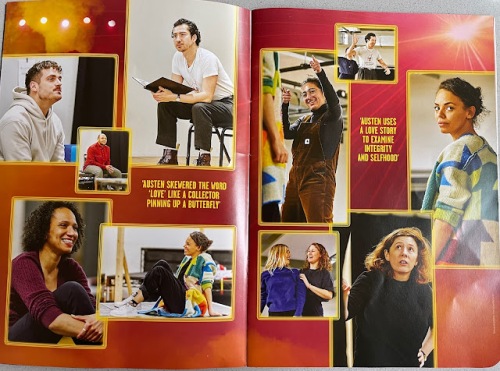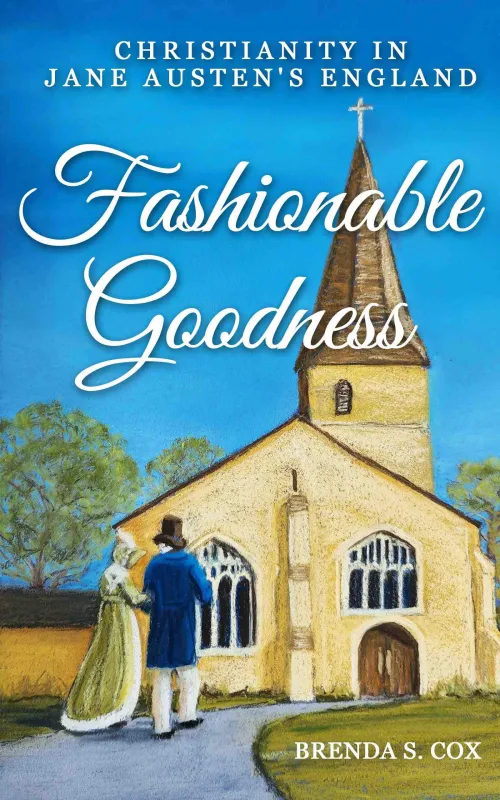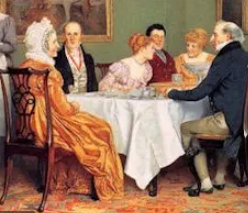Inquiring readers, Persuasion-lite is a cinematic reworking of Jane Austen’s final novel, finished before her death, but not published until afterward. Coming off the heels of Netflix’s highly successful Bridgerton (in this cast of Persuasion-lite you can surmise the former series’ influence) and the popularity of PBS’s Sanditon, the decision-makers behind Netflix productions gave the go ahead to a film that ‘modernized’ Austen’s book in order to introduce young audiences to Jane Austen. Or so the story goes. To do so, Chefs Moderne created a story-telling recipe to appeal to newcomers.
Persuasion’s traditional recipe:
This rich, full-bodied classic was created by a Chef in her prime. Her finished recipe transfigured deceptively simple components into rich flavors heretofore undiscovered by the ordinary palate. The original ingredients, while considered old-fashioned today, are still accessible to epicureans who wish to savor the recipe’s nuanced complexity and its historical references.
Time to digest: hours, with repeated enjoyment over a lifetime. Three Michelin stars were awarded to this Chef, who served distinct dishes that were executed to perfection. (Some might say she would have been awarded four stars had this rating system included such a category.)
Netflix’s Persuasion-lite recipe:
This adaptation took a traditional recipe and simplified it to its basic components, using only those ingredients readily accessible in any grocery store today. While it echoes the original, it pales in comparison and fails to plumb the classic’s rich depths. To be fair, there were hints of originality in the spices. This recipe has been rewritten in modern terms that defy belief.
Time to digest: One hour and 47 minutes. One may partake of repeated helpings at the Netflix buffet. A number of diners might find this meal delicious and insist on more helpings; a number will push half eaten plates away or not order the meal again. Sadly the Chefs Moderne who adapted the recipe were not awarded a single Michelin star, since their efforts resulted in a dish that leaves the diner hungry.
Primary Ingredients:
Anne Elliot
The original recipe described a complex woman of 27 who has lost the bloom of youth. She regrets her decision at nineteen to reject Frederick Wentworth’s proposal due to Lady Russell’s persuasive influence. He had not yet made his mark in life. Anne is a woman of character and conviction who must negotiate the difficulties of living with a shallow father and sisters. As the neglected middle child, she lives largely in their selfish shadows, submitting to her family’s and friends’ needs. When Wentworth reenters her life unexpectedly, she observes her long lost love from afar. From his indifference he seems all but lost to her. Under the Classic Chef’s direction, Anne’s journey back to her Captain via circuitous routes is touching, romantic, and memorable.

Dakota Johnson sharing Anne Elliot’s thoughts. Netflix publicity photo.
The Netflix recipe describes Anne as an opinionated cheeky woman (Dakota Johnson) who gazes at and talks to the viewers (breaking the fourth wall) while stroking her pet rabbit (see image above from Netflix publicity), sharing her thoughts in contemporary language, and swilling red wine. She tells us what’s on her mind and in her mind throughout the production. Her observations, starting with her missing Captain Wentworth, the love of her life, are often amusing. In no way does this reworked Anne reflect Austen’s language or intent. In fact, her comical mannerisms and frequent faux pas wind up as a shallow, one-note substitution for the fully realized original. The makeup department also notably applied lipstick to her mouth, thereby diminishing Anne’s transformation from a wan and mousy woman into someone who blossoms with love when reunited with her captain.
Captain Wentworth
The classic recipe describes Wentworth as a vigorous, successful male, whose pride prevents him from revealing the hurt and, yes, love he still feels for the woman who rejected him. In the classic recipe, one can find instances of his kindness towards Anne and his growing realization that this complex, level-headed, and kind woman is worthy of his regard now as much (even more) as then.
The modern Wentworth is certainly handsome (Cosmo Jarvis), but as written for this lite version, he remains on the sidelines. I wanted him sprinkled more vigorously into this plot, but had to make do with his weak, almost secondary role. Only when Anne reads his letter out loud (it is considered to be one of the best love letters ever written) does the real and complex Austen hero come to the fore.
Mary Musgrove
Her role (Mia McKenna-Bruce) adds much comic spice and her presence in the modern version seems major compared to her irritating presence in the classic. Certainly her ingredient is one-note and overly exagerrated, but her character remains true to Austen’s depiction of a selfish, prickly, and whining sister. One memorable addition not in the classic, but quite original, is of Anne answering her sister in Italian during Mary’s nonstop self-indulgent monologues – which she fails to notice.
William Elliot
His role is stronger in the lite recipe than in the classic. In fact, his (Henry Golding’s) presence overpowers Wentworth’s at times and Anne seems more susceptible to his dubious charms. Why is beyond me, for he shares with her his sleazy plan to prevent a possible marriage between Sir Walter and his daughter’s widowed companion in Bath, a Mrs Clay, who in the original recipe sported a snaggle tooth but who, in the lite version, has an ample bosom. William’s sole aim was to prevent Sir Walter from siring an heir that would knock him out of first place for inheriting what remains of the Elliot estate. His final scene in the film elicited a guffaw from me, but Austen’s classic wit did not look for laughter in the cheap seats and the ending in Persuasion-lite made no sense, for William would never have married a woman with no station in life or money.
Henrietta, Louisa, and Charles Musgrove (Respectively: Izuka Hoyle, Nia Towle, and Ben Bailey-Smith).
Sisters-in-law and husband of Mary Musgrove, they pop in and out of the lite narrative to showcase the sisters’ friendship with Anne and her former and current relationship to Charles. Louisa’s story arc especially moves the plot forward. Charles is Mary’s long suffering husband in the classic version, but the Chefs Moderne use him to demonstrate Anne’s awkward drunken confession during the Musgrove’s dinner party to inform the assembled company that Charles had proposed to her first. The Classic’s sensible, thoughtful Anne would rather have died than commit such crude impropriety.
Supporting Ingredients:
Sir Walter and Elizabeth Elliot
Both characters are sadly given short shrift. Their curt treatment was perhaps intentional, but during their short on screen time, the two actors made their mark. Richard Grant’s performance, while over the top funny, reminds me more of Billy Nighy’s comedic turn as Mr. Woodhouse in Emma. 2020 than the character described by Austen. In Grant’s case, his Sir Walter is certainly fixated on his self-important status, which in the lite version was funny. In the classic version, however, Austen made it clear that as a baronet he sat at the lowest end of the peerage scale, making his egotistical turn even more absurd.
Elizabeth (Yolanda Kettle) is not more beautiful than Anne, as described in the Classic. In fact, she looks anemically pale next to her sister’s vivid coloring. Except for Elizabeth’s sumptuous wardrobe and meticulous hairstyles, one would not have thought her to be the favored older sister. Her mean-spiritedness remains intact, however, and contrasts nicely with Anne’s, well, niceness.
Lady Russell (Nikki Amuka-Bird)
This lady’s well meaning advice separated Anne from her captain. She plays the loving mother substitute and appears just enough in Persuasion-lite to remind us that Anne has had someone in her corner since her mother’s death. As in the Classic, she shows more concern for her young friend than her actual family.
A variety of ingredients (which, sadly, are mostly unrecognizable for uninformed palates in this lite version):
Admiral and Mrs Croft, Captain and Mrs Harville, Mr & Mrs Musgrove and their two young grandsons, Captain Benwick, Mrs Clay, and Lady Dalrymple and Miss Carteret. (Mrs Smith is undetectable.)
Those unfamiliar with the classic recipe will miss their almost absent presence or wonder about their inclusion. Mrs Smith, who made an appearance in the Classic, is ignored, but she was an important witness to William Elliot’s character.
I defy those new to Austen to accurately suss out these characters’ relationship with Anne or the Elliot family. Sir Walter’s attraction to Lady Dalrymple and Miss Carteret is given more importance (we already know he’s a peerage snob) than the elder Musgroves and Mary’s two young boys, or Admiral and Mrs Croft, who play important roles in Anne’s journey back to Wentworth.
Spices:
.
Clothing
Some critics who reviewed Persuasion-lite found the clothes drab and lackluster. Their critiques should have been amended to Anne’s clothes only. Since the makeup department never removed the bloom off her rose, her wardrobe substituted for her appearance, which was ‘“so altered that [Wentworth] should not have known her again.” Her gray and brown spinsterish gowns brighten as she is exposed more to Wentworth’s company. The other actors and actresses are appropriately fashionable for their stations, which reflect clothing in 1816-17 England. I also thought that the homespun, handmade feel of Anne’s wardrobe made sense, in that she was the least favored daughter and probably had her clothes sewn by a local seamstress, whereas Elizabeth and Mary most likely demanded gowns made by modistes in London.
Sites:
Ah, lovely England with its historic villages and great mansions.These were wonderfully represented with beautiful exteriors, interiors and gardens. Two locations played prominent roles.
Lyme Regis: This seaside village plays a pivotal role in both the Classic and Lite versions. The basic storyline of Austen’s plot remains in the lite version, but details are missing. Still, Lyme Regis, the Cobb, the village, and it beautiful shoreline are a visual treat, and many of the scenes do echo the Classic version, and even include bits and pieces of original dialogue.

First glimpse of William Elliot’s carriage in Lyme Regis. At the window from left, Anne Elliot and to her right the Musgrove sisters. To the far right, Mary Musgrove nee Elliot.
Bath: Ah, the buildings, the streets, the views of the Royal Crescent, the walk down the stairs in the Upper Assembly Rooms. There was no promenade in the Pump rooms, where Anne’s famous line to William Elliot is widely quoted (but looked over in the Lite version;)
“My idea of good company, Mr. Elliot, is the company of clever, well-informed people, who have a great deal of conversation; that is what I call good company.’
‘You are mistaken,’ said he gently, ‘that is not good company, that is the best.” – Jane Austen, Persuasion
Although this lovely quote was not included, some of Anne’s conversations were used in Bath, as well as Captain Wentworth’s love letter. Since these scenes lead to the denouement, they ended the film on a high note.
Language:
Here’s where the Chefs Moderne took the greatest license. Instead of using the beautiful language in the Classic, the Chefs Moderne chose modern phrases. I defy you to find them in a Regency era lexicon.
“We are strangers. Worse than strangers. We’re exes.” (Anne Elliot)
“It is often said if you’re a five in London, you’re a ten in Bath!” (Anne Elliot breaking the 4th wall when she looks directly into the camera to converse with the viewer.)
“Marriage is transactional” (Lady Russell)
“Thanks”
“I am an empath” (Mary Musgrove)
“Fart around”
“He’s a ten – I never trust a ten” (Anne about William Elliot)
“Embodying gratitude” (Mary again)
Comment:
Good grief. The Chefs Moderne must have burned their candles down to their wicks to come up with this drivel. After watching Persuasion-lite, those not initiated to Austen’s novels and who love this filmed version, might turn to the novel. Imagine their surprise when they discover that her 205 year old book, filled with the language, customs, and manners of her day, varies significantly from this comic book version.
Personal request: Gentle readers, feel free to agree or disagree with my musings. Let’s keep our discourse genteel and agreeable for the sake of my sanity. I thank you in advance.
Other Critics Reviews:
Negative
“At no point during Carrie Cracknell’s directorial debut do you ever get the sense that anyone’s actually read Persuasion.” – Dakota Johnson is woefully miscast in mortifying Jane Austen adaptation – Clarisse Loughrey, The Independent
“Our demure protagonist Anne Elliot is forever doing supercilious takes and wry monologues to camera, taking despairing swigs from a bottle of red wine in private, occasionally nursing a quirky pet rabbit, and at the end (unforgivably) gives us a wink to seal the deal of our adoringly complicit approval.” Persuasion review – Dakota Johnson looks the part as Jane Austen gets Fleabagged, Peter Bradshaw, The Guardian
Positive
“For anyone not too bothered by departures from the novel, the romantic denouement will be immensely pleasurable.: – Dakota Johnson in Netflix’s ‘Persuasion’: Film Review, David Rooney, Chief Film Critic, The Hollywood Reporter
More reviews:
Netflix’s Persuasion the worst film of the year?, Olivia Pym, GQ Magazine
Persuasion review – a travesty of Jane Austen, Slash Film,
Trailer of the film:
Under this trailer, J.Dion wrote:
“Anne’s strength is her quiet, consistency. She is intelligent and thoughtful. Altering her character for modern sensibilities is insulting not only to Austin’s character but to modern audiences. There are many “Anne’s” in this world they and deserve to be valued for who they are and the enrichment they bring to all.
Persuasion is my favorite of Austen’s novel. Unfortunately this looks to be another instance of the “title and names are unchanged but the characters are missing.”










